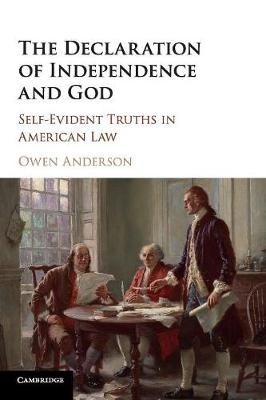
The Declaration of Independence and God
Self-Evident Truths in American Law
Seiten
2017
Cambridge University Press (Verlag)
978-1-107-45904-5 (ISBN)
Cambridge University Press (Verlag)
978-1-107-45904-5 (ISBN)
'Self-evident truths' was a profound concept used by the drafters of the American Declaration of Independence to insist on their rights. In a unique approach combining history, philosophy and law, this book traces the idea of a 'self-evident' God in American legal thought from foundational documents to the present.
'Self-evident truths' was a profound concept used by the drafters of the American Declaration of Independence to insist on their rights and freedom from oppressive government. How did this Enlightenment notion of self-evident human rights come to be used in this historic document and what is its true meaning? In The Declaration of Independence and God, Owen Anderson traces the concept of a self-evident creator through America's legal history. Starting from the Declaration of Independence, Anderson considers both challenges to belief in God from thinkers like Thomas Paine and American Darwinists, as well as modifications to the concept of God by theologians like Charles Finney and Paul Tillich. Combining history, philosophy and law in a unique focus, this book opens exciting new avenues for the study of America's legal history.
'Self-evident truths' was a profound concept used by the drafters of the American Declaration of Independence to insist on their rights and freedom from oppressive government. How did this Enlightenment notion of self-evident human rights come to be used in this historic document and what is its true meaning? In The Declaration of Independence and God, Owen Anderson traces the concept of a self-evident creator through America's legal history. Starting from the Declaration of Independence, Anderson considers both challenges to belief in God from thinkers like Thomas Paine and American Darwinists, as well as modifications to the concept of God by theologians like Charles Finney and Paul Tillich. Combining history, philosophy and law in a unique focus, this book opens exciting new avenues for the study of America's legal history.
Owen Anderson is an Associate Professor of Philosophy and Religious Studies at Arizona State University. His books include The Natural Moral Law: The Good after Modernity (2013) and The Clarity of God's Existence (2008), which study the ethics of belief in God, how God can be known, and the knowledge of God as the highest good.
Introduction; 1. Thomas Jefferson and Thomas Paine; 2. The reformed influence on common sense philosophy; 3. Common sense and self-evident in law; 4. Intuition and the self-evident in law; 5. Naturalism, Darwinism, the self-evident, and law; 6. Revivalism, new religious movements, and law; 7. Liberal theology and legal transformations; 8. Secular and religious goods in the twentieth century; Conclusion.
| Erscheinungsdatum | 02.04.2017 |
|---|---|
| Verlagsort | Cambridge |
| Sprache | englisch |
| Maße | 153 x 230 mm |
| Gewicht | 320 g |
| Themenwelt | Geschichte ► Teilgebiete der Geschichte ► Militärgeschichte |
| Recht / Steuern ► EU / Internationales Recht | |
| Recht / Steuern ► Rechtsgeschichte | |
| Sozialwissenschaften ► Politik / Verwaltung ► Politische Theorie | |
| ISBN-10 | 1-107-45904-4 / 1107459044 |
| ISBN-13 | 978-1-107-45904-5 / 9781107459045 |
| Zustand | Neuware |
| Haben Sie eine Frage zum Produkt? |
Mehr entdecken
aus dem Bereich
aus dem Bereich
neueste Manipulationstechniken als Waffengattung der NATO
Buch | Softcover (2023)
Westend (Verlag)
CHF 33,55
Deutschlands Schwäche in der Zeitenwende
Buch | Softcover (2023)
C.H.Beck (Verlag)
CHF 25,20


